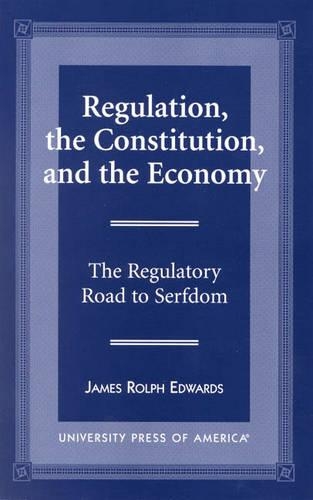
Regulation, The Constitution, and the Economy: The Regulatory Road to Serfdom
(Paperback)
Publishing Details
Regulation, The Constitution, and the Economy: The Regulatory Road to Serfdom
By (Author) James Rolph Edwards
University Press of America
University Press of America
19th November 1998
United States
Classifications
Tertiary Education
Non Fiction
Business and Management
343.7308
Physical Properties
Paperback
256
Width 141mm, Height 212mm, Spine 20mm
336g
Description
Regulation, The Constitution, and the Economy demonstrates the constitutionally degraded and inherently dictatorial character of regulation, its ineffectiveness in curing social ills, and its use as a tool of special interests seeking personal gain in the form of money or power. Regulation became prominent in the late medieval mercantile rent seeking societies, but was little used in the United States until after the Civil War. The author demonstrates the nature of regulation as antithetical to constitutional forms of law, and an antidemocratic franchising of legitimate legislative authority to unelected persons. He provides a history of industry regulation using transportation and public utilities that belies the public interest justification for such regulation and makes its rent-seeking origins clear. The history of social regulation proves less clear, but shows the public harmed more than helped by it, as exhibited through its enormous negative effect on productivity growth and economic activity.
Reviews
Argues that regulation is anti-democratic as a form of law and that its combination of legislative, executive, and judicial functions in the same agencies is in violation of the constitution separation of powers. * Journal of Economic Literature *
Argues that regulation is anti-democratic as a form of law and that its combination of legislative, executive, and judicial functions in the same agencies is in violation of the constitution separation of powers. * Journal of Economic Literature *
